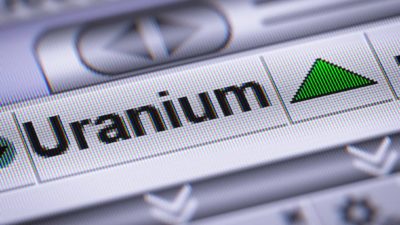The three biggest ASX uranium shares are a mixed bag today as the uranium price continues to decline from its 7-month high in June.
The uranium price is currently US$71.40 per pound, down from $79 per pound on 27 June.
Currently, the Paladin Energy Ltd (ASX: PDN) share price is recovering after yesterday's sell-off, rising 1.59% to $7.37.
The Deep Yellow Ltd (ASX: DYL) share price is up 0.28% to $1.81 after the company released its quarterly report this morning.
The Boss Energy Ltd (ASX: BOE) share price is down 4.02% to $3.58 following the shock news of the CEO's impending exit.
Meantime, the S&P/ASX 200 Index (ASX: XJO) is down 0.03%.
ASX uranium shares a mixed bag on Thursday
Paladin Energy shares are recovering
Paladin released its quarterly activities report and FY26 production guidance yesterday.
As my colleague Bernd reported, the miner produced 993,843 pounds of U3O8 (uranium oxide) at its Langer Heinrich Mine.
This brought the full-year FY25 uranium production to 3,017,415 pounds.
However, 4Q FY25 sales were 710,051 pounds, down from 872,435 pounds in 3Q, bringing the annual total to 2,705,693 pounds.
Investors punished the ASX uranium share yesterday, with the Paladin Energy share price closing at $7.28, down 10.89%, for the day.
Paladin also released a new investor presentation yesterday.
Broker Bell Potter retained its buy rating on Paladin Energy but reduced its 12-month price target from $9.20 to $8.70 after the update.
This is still much higher than the $6.50 target Bell Potter had before adjusting to $9.20 just last week.
Bell Potter commented:
FY26 production guidance is lower than what we had modelled (BPe 4.8Mlbs) which was based off a ramp to full processing capacity in mid FY26.
PDN expects to be running at full capacity in FY27, with the balance of mining fleet (51%) arriving ahead of 2HFY26. Our sales estimate (BPe 4.2Mlbs) was at the upper end of guidance. Our C1 costs of US$41/lb were also below the guided range.
We suspect management guidance is conservative, given the result in 4QFY25, and commentary around performance in 1HFY26 being "in-line" with 4QFY25.
The broker said yesterday's sell-off was an overreaction and a buying-the-dip opportunity for investors.
Boss Energy share price smashed on CEO exit
As my Fool colleague James reported, Boss Energy managing director and CEO, Duncan Craib, will step down on 30 September.
But he will stay on at the company as a non-executive director from 1 January.
Boss Energy said chief operating officer, Matt Dusci, will be appointed managing director and CEO from 1 October.
However, this is subject to the company and Dusci agreeing on terms, which will be announced in due course.
Prior to this news, Macquarie had downgraded its rating on the ASX uranium share from outperform to neutral.
The broker described the changed rating as "a tactical call", partly due to the weakening uranium price.
Macquarie explained:
As SPUT buying completes (next 1-2 weeks?), we expect spot prices could be prone to a ~10% fall (eg. to a carry equilibrium ~US$70/lb).
The broker also reduced its share price target on Boss Energy from $4.60 to $4.45.
In a note, the broker said: "A better accumulation level may present once SPUT buying is complete (1-2 weeks) and spot U3O8 prices settle back".
Macquarie is referring to the $200 million uranium buy-up by the Canadian investment fund, Sprott Physical Uranium Trust (SPUT), which lifted the commodity's price.
The broker said:
Until we see a pick-up in term pricing (eg. Sept/Oct), we expect ASX listed uranium equities to remain correlated to the daily observable spot price.
As SPUT's US$200m buying program completes in the next week or so, we expect spot pricing may need to fall to a level at which utilities can re-enter for carry trades (this might be in the ~US$70/lb zone, an 8-10% fall).
Deep Yellow shares in the green on quarterly activities update
Deep Yellow's quarterly activities report today summarised details released on Monday about its flagship Tumas Project in Namibia.
It said operational planning, engineering, and procurement activities were on schedule.
Process design and project definition documents were now at "approved for construction" status.
Contracts for key utilities and associated infrastructure are also at an advanced stage.
The early works program to prepare the site for major works has largely been completed.
The company said all of this has further de-risked the Tumas Project in preparation for a final investment decision (FID).
Earlier this month, Deep Yellow also told the market it had completed its 3-month mini-pilot testwork at Mulga Rock in Western Australia.
After reviewing that update, Macquarie released a note saying it had maintained its outperform rating on the ASX uranium share.
The broker raised its 12-month price target from $1.70 to $2.05.
Macquarie said the company's Mulga Rock trials were "encouraging".
Macquarie said:
Tumas is shovel-ready in Namibia, pending an improvement in term prices (we expect to occur in the coming months).
Mulga Rock is key to DYL achieving its 7+Mlb/yr scale ambition, and the value enhancement from a lower cost operation (eg, critical mineral credits) could be material.
The broker added:
Mulga Rock resin mini-pilot results have been positive, and should enhance project economics (DFS expected 3Q 2026).
Recent Sprott (SPUT) capital raise appears now ~70% deployed, with perhaps 0.7-0.8Mlb remaining (may complete next week).
We expect term prices to rise later in 2025, and DYL should still have an early-mover advantage in contracting.
What's happening with the uranium price?
Trading Economics analysts say the yellowcake price has fully erased its rally after news of the SPUT commitment broke last month.
The analysts said:
Uranium purchases by Sprott have sharply lifted prices due to how thin uranium derivatives trade.
Yellowcake remained higher since this year's lows as the US government signaled it would support domestic uranium enrichment capacity, cut regulations and accelerate licenses for reactors, and maintain trade restrictions on major nuclear fuel exporters.
In the meantime, top miner Kazatomprom noted it would achieve a mid-point production of 14 million pounds, nearly 20% below its guidance from late 2023, while French Orano said it may close its SOMAIR mine in Niger due to domestic export restrictions.









